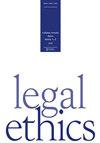Barristers, the Bar Standards Board and the structural bias of appointing disciplinary tribunals in England and Wales
IF 0.3
Q1 LAW
引用次数: 0
Abstract
ABSTRACT The rule against bias is a central tenet of English law and it also impacts on collegiate courts which typically exercise appellate/review jurisdictions over their professional or student members. This is true of the Bar Standards Board (BSB) which has established the adjudicatory bodies to enforce its regulatory framework and has vested the procedure of fair trials upon the Council of the Inns of Court (‘COIC’) which is responsible for appointing the Disciplinary Tribunal panels that conduct hearings for professional misconduct. The COIC has been exposed for ‘irregularities’ in the findings of guilt against barristers who have been adjudged by non-qualified judges. In R (on the application of Mehey & Ors) v Visitors to the Inns of Court and Ors [2014] EWCA Civ 1630, the Court of Appeal ruled that a disciplinary tribunal or a panel of visitors appointed from barristers or lay representatives outside its pool of enrolled judges would still ensure independence and guarantee freedom from outside pressure. The impugned tribunal members who were not entitled to sit nevertheless had authority to act as de facto judges. This part of the ruling reinforces the regulatory bodies inherent power to appoint its own tribunal to adjudicate and it needs a more rigorous application of natural justice principle on the part of the BSB.大律师、律师标准委员会以及英格兰和威尔士任命纪律法庭的结构性偏见
反偏见规则是英国法律的核心原则,它也影响了通常对其专业或学生成员行使上诉/复审管辖权的合议庭。大律师公会标准委员会(BSB)就是如此,该委员会设立了审裁机构,以执行其监管框架,并将公平审判的程序委托给法院委员会(“COIC”),该委员会负责任命纪律审裁小组,就专业不当行为进行听证会。COIC被曝光在对由非合格法官判决的大律师的有罪调查中存在“违规行为”。在R(关于Mehey & Ors的申请)诉法院律师事务所访客案和Ors [2014] EWCA Civ 1630案中,上诉法院裁定,纪律法庭或从注册法官之外的大律师或非专业代表中任命的访客小组仍然可以确保独立性,并保证不受外部压力的影响。被质疑的法庭成员虽然无权开庭,但却有权作为事实上的法官行事。裁决的这一部分加强了监管机构任命自己的法庭进行裁决的固有权力,它需要BSB更严格地应用自然正义原则。
本文章由计算机程序翻译,如有差异,请以英文原文为准。
求助全文
约1分钟内获得全文
求助全文

 求助内容:
求助内容: 应助结果提醒方式:
应助结果提醒方式:


